Summary:
- UnitedHealth Group Incorporated has rewarded its shareholders handsomely with a growing share price and a growing dividend.
- You could do much worse than a 775% return over a decade.
- Within this article, I’ll explain how sometimes a “boring” investment like UnitedHealth Group Incorporated can outperform ‘trendier’ investments, or even the market as a whole.
Ruslan malysh/iStock via Getty Images
Introduction
UnitedHealth Group Incorporated (NYSE:UNH) (“UHC”) is a major healthcare insurance company in the United States, serving over 26 million customers nationwide. UHC operates through several subsidiaries, including UnitedHealthcare, and Optum. UnitedHealthcare provides health insurance to individuals and businesses, while Optum offers healthcare services and technology solutions to healthcare providers.
With a track record of impressive shareholder returns, UHC has rewarded its shareholders handsomely with a growing share price, AND a growing dividend.
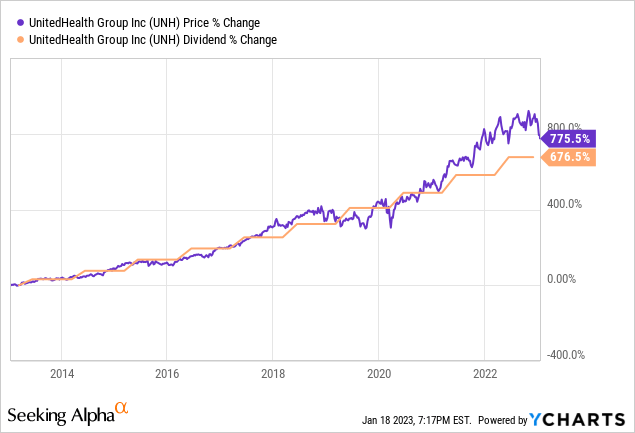
You could do worse than a 775% return over a decade… in fact, you could do much worse than that. In fact, three of the most popular funds, (SPY), (QQQ), and (ARKK), were all trounced by UHC’s returns.
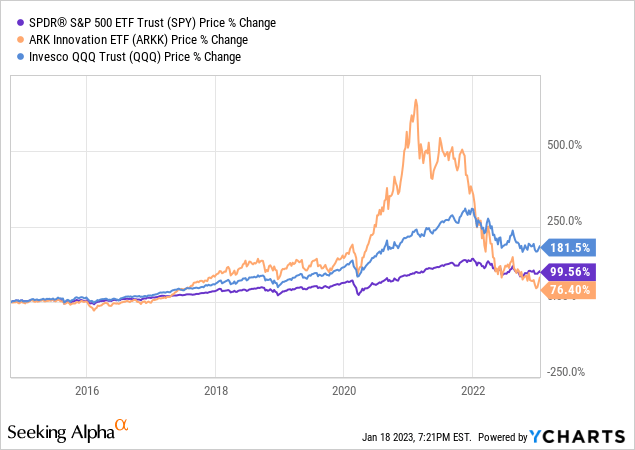
Within this article, I’ll explain how sometimes a “boring” investment like UHC can outperform ‘trendier’ investments, or even the market as a whole.
Steady Industry
Part of the reason why UHC has been able to outperform is due to the industry it operates in. The healthcare insurance industry is relatively steady because it is driven by a number of secular long-term trends.
Investors love stability and predictability.
Global Aging: The main factor driving the steady growth of the healthcare industry is the aging population and the increasing demand for healthcare services. As people live longer, they are more likely to require healthcare services, which creates a steady demand for healthcare insurance, thereby increasing the number of years people pay UHC.
Barriers to Entry: Additionally, the healthcare insurance industry is relatively steady because of the high barriers to entry. The industry is tightly regulated, and it requires significant capital and expertise to enter. This creates a barrier to entry that protects existing companies from new competition, thus ensuring a steady demand for their products and services from the incumbents, the largest of which is UHC.
These factors help to ensure a steady demand for healthcare insurance, which helps to provide stability for healthcare insurance companies and their investors.
Growth
At $445B market cap, UHC is one of the largest companies in the world. As companies grow to the scale that UHC has reached they often face increasing scrutiny as they attempt to acquire additional companies.
This could pose a threat to UHC, because, without M&A, they would have fewer options to deploy capital which could erode returns. Sure, dividends and buybacks are great, but internal uses for capital can be limited, especially in mature industries like healthcare insurance.
If M&A opportunities dry up it could lead to a major slowdown in revenue and earnings growth, calling into question whether this trend can continue:
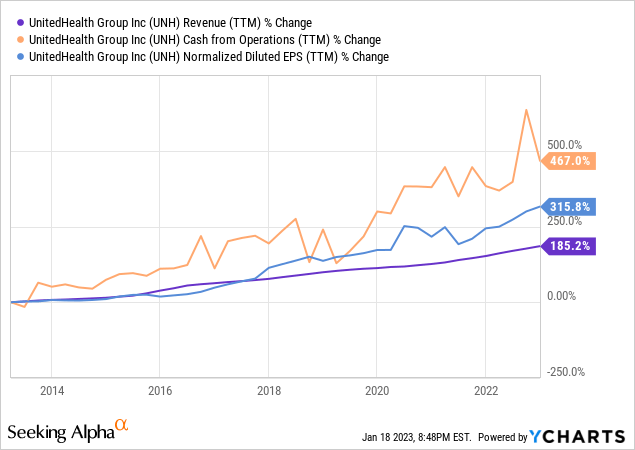
Companies have a duty to their shareholders to maximize shareholders. But at the same time, governments have a duty to society to prevent monopolies from forming. Because of this, large-scale M&A-related litigation has become a recurring thread in the U.S.
Change Healthcare
Perhaps, to bolster its position in health care analytics and technology, UHC announced the acquisition of Change Healthcare in January 2021. If you’re interested, I wrote more about the potential benefits of the acquisition in my last article on UHC which you can read here.
In February 2022, the United States Department of Justice (DOJ) announced that it had filed a lawsuit in federal court to block UnitedHealth Group’s proposed acquisition of Change Healthcare. The DOJ argued that the acquisition would likely lead to higher prices and reduced competition in the healthcare technology market.
The DOJ claimed that UnitedHealth Group and Change Healthcare are two of the largest providers of healthcare technology services in the country and that the merger would result in a dominant market position that would allow the combined company to raise prices and could stifle innovation. The DOJ also claimed that the merger would eliminate a key competitor in the market and reduce the incentives for other companies to invest in healthcare technology development.
UnitedHealth Group stated that it believes the acquisition is pro-competitive and will bring significant benefits to customers, including more efficient and effective healthcare services.
Not so fast DOJ…
Interestingly, the DOJ lost its lawsuit and UHC finally closed on its acquisition of Change Healthcare in October 2022.
The fact UHC was able to fight the DOJ and win should be reassuring for investors looking at large-cap companies questioning whether they will be able to continue deploying capital on such large acquisitions.
Perhaps it’s too early to draw a conclusion, but it’s my view that the courts may be more sympathetic to M&A than the DOJ which may lead to similar lawsuits yielding a similar result and increased consolidation across industries.
Returns on Invested Capital
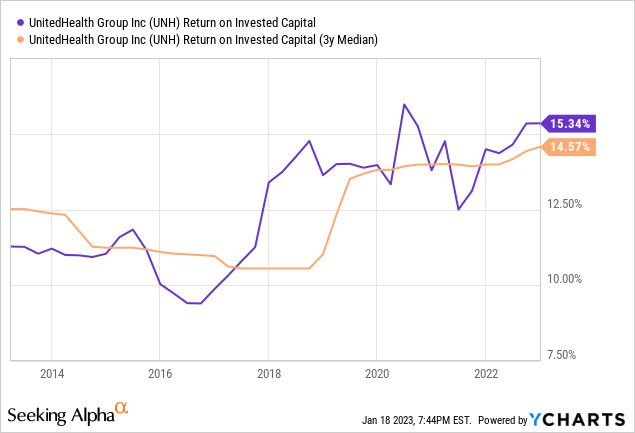
Seeing the acquisition of Change Healthcare go through gives me increased faith In UHC’s ability to generate strong returns on capital for shareholders for a longer period of time. Over the last 3 years, UHC has boasted an average of 14.5% returns on invested capital and has been able to earn over 10% (on average) for over a decade now.
Such strong returns on capital allow UHC to return capital to shareholders while still having enough left over to grow the bottom line through organic measures.
Dividend and Buyback
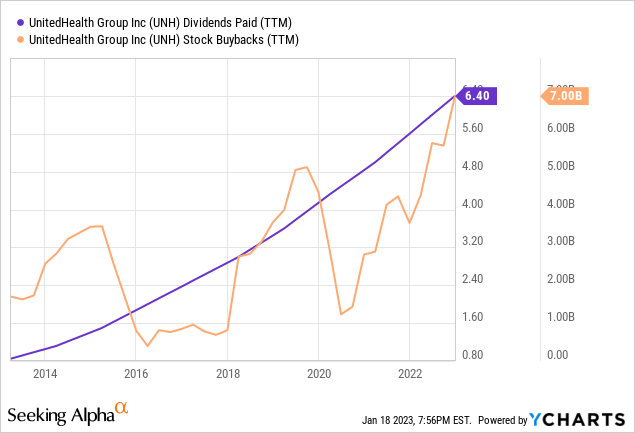
As you can see in the chart above, UHC has consistently grown its dividend to shareholders while at the same time spending billions more to buy back its stock, increasing your ownership stake.
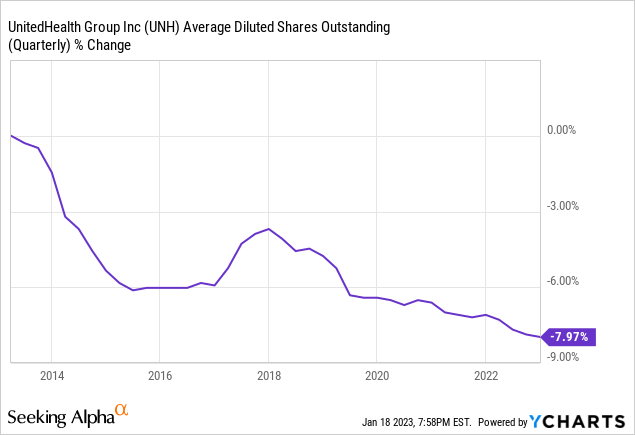
If you had purchased UHC 10 years ago, you would own roughly 8% more of the company than you did back then and your dividend would be over 600% higher than before! Because of that, I believe that UHC is the sort of investment that could work well for a number of investors, both growth and value investors can find something to like in UHC.
Valuation
First of all, let’s compare UHC’s results to some of its competitors.
EPS and Revenue Growth Comparison
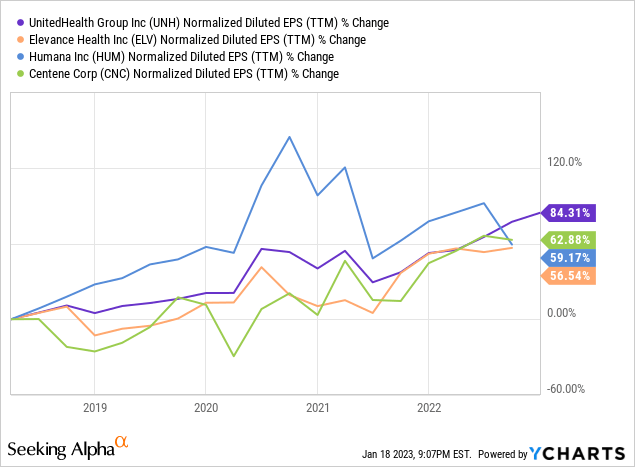
In terms of EPS growth, having grown by 84%, UHC bested all of its peers over the last 5 years by more than 20%. Impressive results considering they are such a large company.
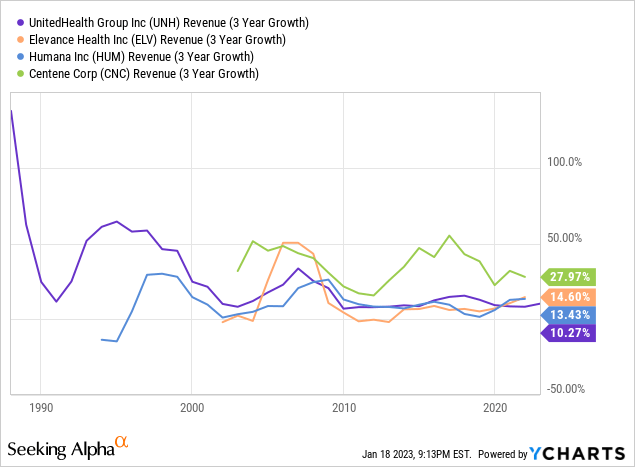
As far as revenue growth goes, they are somewhat behind some of their peers, as you can see in the nineties. When UHC was much smaller, they were able to grow at a much faster clip.
ROIC Comparison
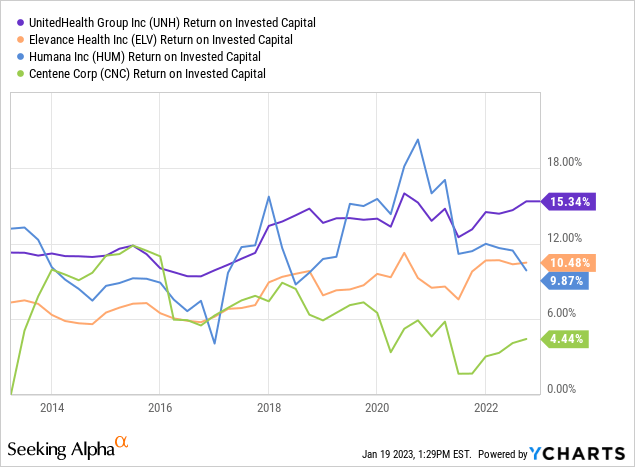
Circling back to ROIC we can see that UHC, with a ROIC of ~15% is higher than all of its peers, which suggests that while UHC may not be growing as fast as its peers it may be a superior capital allocator.
Forward P/E Comparison
| Company | Current Stock Price | EPS 2023 Est. | 2023 P/E |
| UNH | $484 | $24.95 | 19.4 |
| (ELV) | $480 | $32.69 | 14.7 |
| (HUM) | $492 | $28.01 | 17.6 |
| (CNC) | $76 | $6.36 | 11.9 |
| Average PE (excl. UNH) | 14.7 |
Comparing UHC’s forward P/E to some of its peers reveals that they may be overpriced at 19.4x forward earnings. UHC’s peers trade between 11.9x and 17.6x forward earnings. If UHC were valued like its peers, the stock price could resemble this:
Forward PE Comparison (Author’s Calculation and Analyst Expectations)
Discounted Cash Flow Analysis
To get an alternate measure of valuation, I ran a discounted cash flow (“DCF”) analysis on UHC. I assumed a medium-term 9% growth rate and a terminal growth rate of 2%. 2023, and 2034 revenue and earnings estimates come from the average analyst expectation as found in Yahoo Finance.
Here is a portion of that DCF:
| 2023 | 2024 | 2025 | 2026 | 2027 | |
| Revenue | $359,000 | $386,000 | $420,740 | $458,607 | $499,881 |
| Net Income | $23,312 | $26,442 | $28,822 | $31,416 | $34,243 |
| Cash Flow | $21,935 | $23,584 | $25,707 | $28,020 | $30,542 |
According to the model, UnitedHealth Group Incorporated shares are worth roughly ~$402 each, indicating there may be some room for further contraction of the stock price.
Conclusion
In conclusion, UnitedHealth Group Incorporated’s acquisition of Change Healthcare is a strategic move that puts the company in a position company to capitalize on the growing healthcare technology market and strengthen its core insurance offering.
Because of its steady recurring earnings power, UHC is an attractive opportunity for those looking to gain exposure to the healthcare industry.
My only concern with UHC is its valuation, at 19.4x forward earnings, compared to its peers, the stock appears to be overvalued given the average peer multiple is 14.7x. The DCF model backs this up, suggesting its cash flows are worth just $402 per share.
Given its strong returns on capital, I believe that UHC ought to trade at a premium to its peers, but perhaps the whole segment is overvalued.
All in all, I rate UnitedHealth Group Incorporated a hold with a 1-yr price target of $436.
UnitedHealth Group Incorporated looks like a good long-term hold, but I simply cannot pull the trigger on shares at these elevated levels.
Thank you!
If you reached the end of the article, thank you! I’m incredibly appreciative of all my readers. At the end of the day, I really do this for you. So if there is anything you would like to discuss in the comments below please let me know! Have an amazing day.
Disclosure: I/we have no stock, option or similar derivative position in any of the companies mentioned, and no plans to initiate any such positions within the next 72 hours. I wrote this article myself, and it expresses my own opinions. I am not receiving compensation for it (other than from Seeking Alpha). I have no business relationship with any company whose stock is mentioned in this article.
Additional disclosure: Not financial advice.
